PES English | Planejamento Anual | 2023
Sumário clicável
Toddlers’ Time 3 – 3 anos de idade | Educação Infantil ............................................ 2
PES Kids A – 4 anos de idade | Educação Infantil....................................................... 4
PES Kids B – 5 anos de idade | Educação Infantil
PES Kids 1 – 1º ano | Ensino Fundamental
6
7
Junior 2 – 2º ano | Ensino Fundamental 8
Junior 3 – 3º ano | Ensino Fundamental 10

Junior 4 – 4º ano | Ensino Fundamental 12
Junior 5 – 5º ano | Ensino Fundamental .................................................................. 14
Mission: English 1 – a partir do 6º ano | Ensino Fundamental................................ 16
Great Time 2 – a partir do 7º ano | Ensino Fundamental
Great Time 3 – a partir do 8º ano | Ensino Fundamental
19
21
Great Time 4 – a partir do 9º ano | Ensino Fundamental 23
Great Time 5 – a partir da 1ª série | Ensino Médio 25
Great Time 6 – a partir da 2ª série | Ensino Médio 28
1
▪
▪
▪
▪
.......................................................
.................................................................
▪
▪
▪
▪
▪
▪
▪
........................................
▪
........................................
▪
▪
Conteúdos
WELCOME
Unit The Magic Forest
Unit 1 - Let’s Draw!
Unit 2 - Let’s Play!
Greenman, Sam, Nico, Rabbit, Hedgehog, Frog, Stella; Hello, I’m (Sam). What’s your name?
teacher, table, chair, book, crayon, pencil; What’s this? It’s a (pencil). It’s red. happy/sad red circle
ball, teddy, doll, train, bike, car; There’s one (blue) (train). Here you are. / Thank you. fast/slow blue 1
Autumn Fun! (Review 1) classroom and toys vocabulary
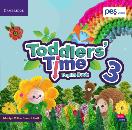
Unit 3 - The Big Monster
Unit 4 - My Family
eye, ear, mouth, nose, hair, face; I can see one (big) (face). I can see two (big) (ears). It’s got one (big) (mouth). It’s got two (big) (eyes).
mummy, daddy, brother, sister, baby, friend; Who is it? It’s (Sam’s) brother. They look (the same). They’ve got (big) (eyes).
Winter Fun! (Review 2) face and family vocabulary
Unit 5 - Where’s My Bird?
Unit 6 - Let’s Tidy Up!
big/small green 2
same/different yellow 3 triangle
turtle, fish, bird, hamster, cat, dog; Can you see your (bird)? It’s (on) the (table). The (cat) is (under) the (chair). on/under 4 square
sandwich, cake, pasta, apple, banana, milk; I like (milk). I don’t like (pasta). Let’s (eat).
tidy/messy rectangle
2 PES TODDLERS 1º bimestre Welcome Unit, Unit 1 2º bimestre Units 2, 3 3º bimestre Units 4, 5 4º bimestre Unit 6 1º trimestre Welcome Unit, Units 1, 2 2º trimestre Units 3, 4 3º trimestre Units 5, 6
Toddlers’ Time 3 – 3 anos de idade | Educação Infantil Unit Language Concepts Colours Numbers Shapes Routines
red, blue, green, yellow 1–4 circle, triangle, square, rectangle
Programáticos
Weather: sunny, cloudy, windy, raining/rainy, snowing/snowy, hot/cold.
Spring Fun! (Review 3) pets and food vocabulary
Festivals
Halloween: cat, monster, pumpkin. Christmas: Christmas, tree, toy. Easter Carnival: Easter egg, bunny, chocolate Green Day: forest, flower, beautiful
Summer Fun! (Review 4) course vocabulary
Emotions Value Phonics Big Book
Sam’s family is moving to the house next to Nico, and her dog discovers a secret gate in the garden that leads to the Magic Forest…! In this story your child will learn about introductions and the names of the main characters in the stories.
sad/happy creativity s (Stella)
excited fun g (Greenman, green) b (book, blue)
fear imagination n (Nico, nose) m (mouth)
Greenman is sad because the forest is covered with tree leaves. Then Sam has a wonderful idea… They can play a game and use the leaves to make a beautiful picture! In this story, the children will learn about being happy and sad and the value of creativity, while they review the unit vocabulary and structures.
The children share their toys with Greenman and their forest friends, and Rabbit falls in love with his new blue teddy bear! In this story, the children learn about being excited and the value of fun, while they review the unit vocabulary and structures.
It’s a windy day in the forest and Frog is very scared about a big face on the water! Luckily, Greenman is there to show him that it’s only his reffection and remind him that It’s windy! In this story, the children learn about being afraid and the value of imagination, while they review the unit vocabulary and structures.
curiosity family f (frog) u (umbrella)
worried/ relieved helping d (dog) c, k (cat, kitten)
Greenman is very curious about Sam’s family and the fact that they all look alike. He shows Nico his own family, where they all look different! In this story, the children learn about curiosity and the value of family, while they review the unit vocabulary and structures.
Nico is worried because he’s lost his pet bird and his pet turtle. With Greenman and Sam’s help they eventually find them in the forest, to everyone’s relief! In this story, the children learn about the emotions of worry and relief, and the value of helping each other, while they review the unit vocabulary and structures.
regret being tidy p (pasta)
h (hedgehog), a (ant) r (rabbit, red) e (egg) t (tree)
Sam, Nico, Greenman and the forest animals are in the forest having a summer picnic. Sam and Nico are making a bit of a mess and Greenman reminds them Let’s tidy up! In this story, the children learn about recognising when you have done something wrong, and the value of being tidy, while they review the unit vocabulary and structures.
3
Hello, Goodbye I’m (Danny) I’m happy green Let’s be friends!
teacher, chair, table, crayon, book My (book). Yes/No I’m scared one Let’s go to school!
mommy, daddy, baby, brother, sister This is my (mommy) I’m upset red We love you, Jack-Jack!
head, hands, legs, tummy, face This is my/your (head). I’m active (value) two Let’s play with Woody!
living room, bedroom, bathroom, kitchen, yard I have a (bedroom) I’m tired blue Play a lot, sleep well!
dog, mouse, bird, cat, fish I have a (bird) I’m curious three Russell loves animals teddy bear, blocks, ball, doll, car I like my (ball) I’m sad four Boo shares toys
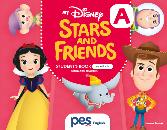
banana, apple, cheese, water, sandwich I like (cheese) I’m hungry yellow Olaf likes picnics!
T-shirt, shirt, coat, hat, dress It’s a (hat). It’s (red) I’m proud five Dumbo gets dressed
4 PES KIDS 1º bimestre Units 1, 2, 3 2º bimestre Units 4, 5 3º bimestre Units 6, 7 4º bimestre Units 8, 9 1º trimestre Units 1, 2, 3 2º trimestre Units 4, 5, 6 3º trimestre Units 7, 8, 9 Conteúdos Programáticos PES Kids A – 4 anos de idade | Educação Infantil Lesson 1 Vocabulary Lesson 2 Grammar Lesson 3 Feelings Lesson 4 Colours & Numbers Lesson 5a Storytime
New Receptive Language
I’m friendly Hello and goodbye Make: Happy dwarf mask Finding Nemo Gg, goodbye What’s your name?
I listen Our schools
I love my family Our families
Make: Morty and Ferdie’s classroom and pencil-topper puppets Toy Story 4 Tt, teacher
Make: Incredibles family picture frame Inside Out Mm, mommy
I’m active We are active Make: Woody and Jessie puppets Pinocchio Hh, head
What’s this? [Is it a ? ], book, It’s (a chair/ Mickey). sock
“Who’s this? Is this your …? What’s wrong?
“What’s this? How many …?”
I sleep well Our homes Make: house-rooms matching game UP! Kk, kitchen “What’s this? Is it (color)? What color?”
I’m kind to animals Our animals Make: Up! jigsaw Sleeping Beauty Ff, fish
“What’s this? What do you have? How many ...?”
I share my toys Our toys Make: Monsters Inc. pairs game Peter Pan Bb, ball “What’s this? Where’s the …? How many…?”
I eat healthy food Our food Make: Frozen lunchbox and food Brave Ss, sandwich
Be yourself Our clothes Make: Dress-up Dumbo Zootopia Dd, dress
“Do you like ...? What color?”
“What’s this? What colour is it?”
5
Lesson 5b Values Lesson 6 Real world Lesson 7 Review Disney movie lesson Phonics and letters
PES Kids B – 5 anos de idade | Educação Infantil
Lesson 1 Vocabulary
Lesson 2 Grammar
Lesson 3 Feelings
Lesson 4 - Colours, Numbers & Shapes
Lesson 5a Storytime
pencil case, marker, pencil, lunchbox, backpack, eraser It’s a (pencil case). I’m worried six, seven Back to school
hot, cold, sunny, rainy, snowy, windy It’s (sunny). I’m excited white, black Olaf’s sunny day
face, hair, eyes, ears, nose, mouth I have (two eyes). I’m silly circle, rectangle Guess who?
basketball, tablet, bike, scooter, jump rope, kite I have (a bike). I’m happy eight, nine Let’s play fruit, cookies, pizza, burger, salad, juice I like (fruit). I’m thirsty orange, purple Russell is lost bed, picture, window, rug, toybox, bookcase It’s on the (rug). I’m upset square, triangle Woody helps out
cow, duck, goat, hen, horse, sheep I can see (a cow). I’m surprised ten Farm surprise!
slide, swing, climbing wall, seesaw, sandbox, treehouse I’m in the (sandbox) / I’m on the (slide). I’m angry pink, brown Playground fun
climb, swim, hide, ffy, jump, run I can (climb). I’m tired all colours and shapes Simba can listen
I’m kind Schooltime
Make: Mickey Mouse pencil pot Toy Story 3 Ll (lunchbox) What’s that?
I love my friends Weather Make: Olaf’s weather mobile Bambi Rr (rainy) What’s the weather like?
I love bedtime Faces Make: Monster buddy (face & parts) Frozen Nn (nose) Look at me!
I play outside Playtime Make: Minnie’s kite Big Hero 6 Jj (jump rope) What do you have?
I share Lunchtime Make: Russell’s picnic Ratatouille Pp (pizza) What do you like?
I help out Bedrooms Make: Bonnie’s bedroom Tangled Ww (window) Where’s / Where are
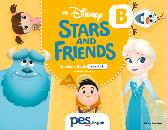
I say sorry Farm animals Make: Cinderella’s farm Beauty and the Beast sh (sheep) What can you see?
I take turns Playgrounds Make: Playground puzzle Toy Story 4 ch (chair) Where are you?
I can listen Active fun Make: Simba & Nala masks The Incredibles th (thirsty) Look at me!
6
Lesson 5b Values Lesson 6 Real world Lesson 7 Review Disney movie lesson Phonics and letters New Receptive Language
PES Kids 1 – 1º ano | Ensino Fundamental
Lesson 1 Vocabulary
Lesson 2 Grammar Lesson 3 Feelings
Lesson 4 - Colours, Numbers & Shapes Lesson 5a Storytime
hippo, elephant, lion, zebra, monkey, giraffe This is a/an (hippo). I’m curious red, yellow, blue, purple, green, pink, orange, brown, black, white What’s this?l
present, strawberry, candle, cake, balloon, ice cream I’d like a/an (balloon). I’m surprised one, two, three, four, five, six, seven, eight, nine, ten Peter Pan’s partyy
grass, tree, ffower, ant, butterffy, bee The (butterffy) is in/ on the (ffower). I love circle, rectangle, square, triangle, heart Where’s the ant?
sun, moon, cloud, rainbow, star, rain I can see (the sun). I feel safe
circle, rectangle, square, triangle, heart, star, red orange, yellow, green, blue, purple Where’s my rainbow?
smell, taste, hear, see, touch I can hear/touch/ taste/ smell I’m sad eleven, twelve, thirteen, fourteen, fifteen Where’s the rabbit?
train, bus, plane, boat, bike, car This (car) is fast/slow/ big/small. I’m excited color patterns Be careful!
fish, whale, octopus, seahorse, turtle, ray The (octopus) is (pink). I’m scared sixteen, seventeen, eighteen, nineteen, twenty What is it?
school, grocery store, park, restaurant, toy store, house There’s a (house). I’m proud of sizes and shapes Where’s Fru Fru?n
sweater, pants, socks, shoes, shorts, costume I’m wearing (a sweater). I’m angry numbers, shapes, colors What does he want?
New Receptive Language
I try new things Animals and me Make: a Simba and Nala role play Zootopia A a, cat What’s this?

I’m polite My party Make: a present Alice in Wonderland E e, ten What would you like?
I care about nature Amazing nature Make: butterffy and ffower finger puppets A Bug’s Life I I, sit Where’s the (bee)?
I can help Day or night? Make: a sky mobile La Luna O o, hop What can you see?
I keep trying My house Make: senses picture cards Ratatouille U u, sun
What can you hear/ touch/taste/smell?
I’m careful Toy transportation Make: a pedestrian crossing Cars 2 hat Is it fast/slow/big/ small?
I’m brave Ocean colors Make: an ocean scene Pinocchio bed What color is the (octopus)?
I make an effort Fun places Make: a puzzle Monsters inc. bus What’s there? What’s in the city?
I’m calm My favorite clothes Make: an Incredibles mask and badge Big Hero 6 stop What are you wearing?
7
Lesson 5b Values Lesson 6 Real world
Lesson 7 Review Disney movie lesson Phonics and letters
This is my… Pets: bird, cat, dog, fish I’ve got a (fish). I’ve got (two) brothers.
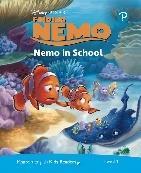
Mini-beasts:
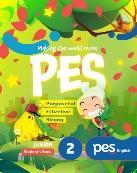
8 PES Junior 1º bimestre Welcome Unit, Unit 1 2º bimestre Units 2, 3 3º bimestre Units 4, 5 4º bimestre Unit 6 1º trimestre Welcome Unit, Units 1, 2 2º trimestre Units 3, 4 3º trimestre Units 5, 6 Conteúdos Programáticos Junior 2 – 2º ano | Ensino Fundamental Reader: FINDING NEMO by Melanie Williams Vocabulary 1 Grammar 1 Vocabulary 2 Grammar 2 WELCOME UNIT to Rise and Shine Towers Numbers 1–10; colors: black, blue, brown, orange, pink, purple, red, white, yellow Hi!/Hello! What’s your name? I’m…/My name’s… Classroom objects: bag, book, chair, desk, door, pencil Classroom
quiet, Listen, Look, Sit down
1. Old toys, new toys Toys: ball, car, doll, elephant, robot, tablet, teddy bear, train What’s this? It’s a (car).
small, new, old
2. All kinds of families Review 1 Important to me (Units 1 and 2) Family: auntie, brother, dad, grandad, granny, mum, sister, uncle Who’s this?
3. Amazing bodies Body parts: arms, ears, eyes, feet, hands, legs, mouth, nose
4. Let’s eat up Review 2 All about me (Units 3 and 4) Food: bananas, bread, cheese, chicken, milk, olives, strawberries, tomatoes
I don’t like (chicken).
cream,
pizza, sandwiches
5. Nature around us
duck, fox, frog, lizard, mouse, owl, rabbit, turtle
can see a…
can see
language: Be
It’s a (desk). It’s (brown).
Adjectives: big,
It’s (old).
I’ve got (brown) eyes/ two arms. Actions: dance, hop, jump, run I can/can’t…
I like (bananas).
More food: ice
milkshake,
Do you like (pizza)? Yes, I do./No, I don’t.
Animals:
I
, I
(two) (frogs).
6. Let’s dress up Review 3 Around me (Units 5 and 6)
dress, jumper, pajamas, shirt, shoes, shorts, T-shirt, trousers
ant, bee, butterfly, ladybird Is it a… ? Yes, it is./No, it isn’t.
Clothes:
I’m wearing (a) (dress).
Goodbye Happy holidays! Have a good time! Goodbye! See you soon!
Feelings: cold, happy, hot, sad I’m (cold/hot/ happy/sad).
Autumn: apple, chestnut, fire, leaf, pumpkin, tree; It’s windy!
Winter: boots, gloves, hat, light, scarf, snow; It’s snowy!
Spring: blossom, butterfly, chick, egg, flower, lamb, rabbit; It’s cloudy!
Summer: beach, ice-cream, picnic, sun hat, sunglasses, sunny, swimming costume; It’s sunny!
My sounds Communicative outcome
p, b
Describing favorite object
Global citizenship
• Let’s be friends I care about my community.
• Sharing toys bike, kite, music box, plane
Functional language and real-world Project
Rules of common courtesy How old are you? I’m six. A plant pot
t, d Describing toys
Presenting family and people around you
Old for me, new for you – I share and recycle my toys. See, value and appreciate old toys. Respect the toys of others.
• Celebrating families cousin, friend, neighbor, pet
Polite requests Can I play, please? Yes, let’s play./ Here you are. A class toy swap g, c
• Love your family and pets. Respect and celebrate differences among people’s families. Understand the importance of the wider community as a family.
Expressing thanks This is for you! Thank you! A family circle m, n
Describing abilities / what you can do
• Playing games together clap (your hands), close/open (your eyes), touch (your feet), move your body Respect differences and different abilities. Self-worth: appreciate our bodies and abilities
• Trying different foods pasta, rice, salad, soup
Imperative instructions and paying a compliment Touch your nose! Well done! A talent show h, ch
Asking about likes and dislikes
• Find out about the food you eat. Developing personal identity through food.
• Exploring nature flower, grass, pond, tree
Asking for food Can I have a/an…, please? Here you are. A class lunch s, f
Describing insects and animals
Describing clothes; giving advice / making suggestions about what to wear
• Respect animals.
• Find out about living things. Share the world
• Appreciating special clothes boots, hat, jeans, skirt Appreciate and understand difference and diversity (cultures, clothing, traditions).
• Feel good in the clothes you wear.
Inviting and giving advice Come to my party! Wear a (big) (hat)!
A costume doll
Making plans/ suggestions Let’s find (a) (butterfly)! A park collage sh, j
9 Seasons
Numbers 11–20; days of the week
It’s Monday! This is / That’s (Stella).
Have you got…? Yes, I have. / No, I haven’t.
School items: notebook, pen, rubber, ruler
This is my / That’s your (pen). How many (pencils)?
Adjectives: dark, fair, long, short He’s / She’s got…
Home: bathroom, bedroom, garage, garden, hall, kitchen, living room, stairs
Farm animals: chicken, cow, donkey, goat, goose, horse, sheep, turkey
Activities: catch, climb, kick, ride, skate, skip, swim, swing
Where’s (Mum)? She’s in the (kitchen).
There’s a (chicken). There isn’t a (cow).
Can you (skip)? Yes, I can. / No, I can’t. But I can (swim).
Furniture and objects in a house: bed, lamp, sofa, table Where’s the (lamp)? It’s on / next to the
On the farm: bush, fence, rock, wall Where’s…? It’s (behind) (the wall).
Verbs with play: play a board game, play football, play tennis, play the guitar

Food: burger, biscuit, carrot, cereal, egg, fish, juice, orange
Holiday activities: build a sandcastle, collect shells, go on holiday, play on the beach, read comics, sleep
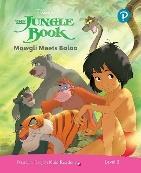
What are you doing? I’m (cooking).
I want to (play on the beach).
Meal prep: cook, grow, make, wash
Time of day: in the morning, in the afternoon, in the evening, at night
world: desert, hill, jungle, mountain, ocean, sky
oceans: dolphin, octopus, seahorse, seal, shark, whale
cloud, day, moon, night, star, sun
Can he/she…? Yes, he/she can. / No, he/she can’t.
Are you (making) (a salad)? Yes, I am. / No, I’m not.
Do you want to (play) (in the morning)? Yes, I do. / No, I don’t.
10
Junior 3 – 3º ano | Ensino Fundamental Reader: THE JUNGLE BOOK, by Nicola Schofield
Vocabulary 1
Grammar
1
Vocabulary
2
Grammar
2 WELCOME UNIT to Rise and Shine Explorers Club
1. Let’s explore together My
things: backpack, belt, cap, coat, glasses, scarf, trainers, watch
2. Let’s be happy at home Review 1 Important to me (Units 1 and 2)
3. Let’s explore nature
4. Let’s try new activities Review 2 All about me (Units 3 and 4)
5. Let’s share our food
6. Let’s have holiday fun Review 3 Around me (Units 5 and 6)
Goodbye Happy holidays! Celebrations Let them shine!
beautiful,
Amazing
Let them fly!
balloon, barbecue, cake, candle, present, sparkler
My sounds Communicative outcome Global citizenship Functional language and real-world Project
th (voiced), th (voiceless)
Describing objects in a basic way
Describing people in a basic way
r, l Prepositions of place
oo, ee
Imparting personal information
• I like numbers and math. How many (pencils)?
• I appreciate my community builder, chef, explorer, teacher
• Celebrate real-life heroes. Appreciate people in your community.
• I learn about different homes. cave, igloo, tent, treehouse
• Appreciate and understand difference and diversity.
My favorite number is (fourteen).
My Explorers Club passport w, y
Commenting on a photo Look at this! What a great photo! A club book
Making suggestions
Let’s put (the lamp) here. Good/Great idea! A perfect house
Asking for and giving information
Describing what there is / isn’t
• I learn about the five senses. hear, see, smell, taste, touch⚫ Getting to know nature through the senses. Notice the details.
Talking about what people can do
• I know how to enjoy music. drums, piano, recorder, violin What do you need to play these instruments? Discovering different sounds and how they make you feel.
Excuse me, where’s (the garden)? It’s (next to) (the café).
Accepting/declining an invitation
A five senses park a, i
Would you like to join my club? Yes, of course! / No, thanks.
Asking about what someone is doing
u, e
Asking about holiday activities
• I learn about different ingredients. butter, flour, fruit, vegetables What’s our food made from?
• I stay safe on holiday. dangerous, flag, safe, sea
• Respecting nature. Being aware of dangers in water.
Going shopping
A club i, o
What’s on the shopping list? I need (carrots). Okay, let’s go shopping!
Expressing preferences / likes and dislikes
A food truck
I like the sea. I don’t. I like cold weather. A holiday trip
11
Numbers 20–50; places in a library: courtyard, gallery, information desk, multimedia room, reading corner, study area
School subjects: Art, Drama, English, Geography, History, ICT, Math, Music, PE, Science
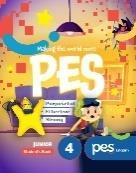
Places in a town: bus stop, café, cinema, hospital, pharmacy, police station, shop, sports center, supermarket, town square
Book characters: astronaut, dragon, giant, monster, pirate, prince, princess, spy, storyteller, superhero
Hobbies: acting, coding, having a party, juggling, learning an instrument, painting, playing chess, playing computer games, swapping cards, taking photos
Animals: leopards, lions, monkeys, pandas, parrots, penguins, rhinos, snakes, tigers, zebras
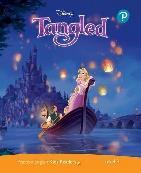
Outdoor activities: building a den, cycling, doing a nature trail, drawing, fi shing, having a picnic, reading a map, rockclimbing, sailing, skateboarding
The (library) has / hasn’t got (a gallery).
What have you got on (Monday)? I’ve got (Art) and (Geography) on (Monday).
Items in a library: beanbag, computer, poster, television
Routine actions: brush my teeth, go to bed, go to school, have breakfast, have a shower, wake up
Has the (library) got (computers)? Yes, it has. / No, it hasn’t.
What time do you (wake up)? I (wake up) at (seven o’clock).
There are some (shops). There aren’t any (schools).
The book is about (a giant). Is she (happy)? Yes, she is. / No, she isn’t.
Jobs: bus driver, doctor, librarian, police officer, shop assistant, waiter
Is there a… ? Yes, there is. / No, there isn’t. Are there any… ? Yes, there are. / No, there aren’t.
Adjectives: brave, clever, cute, kind, scary, strong
She likes (taking photos). He doesn’t like (playing chess).
Tigers can / can’t (run). Can they (ff y)? Yes, they can. / No, they can’t.
Activities: being outside, doing crafts, doing sport, helping people, learning something new, using computers
Animal parts: feathers, fur, spots, stripes, tail, wings
He / She’s (fi shing). He / She isn’t (cycling).
Places in nature: countryside, forest, island, lake, mountain, river
Are they (clever)? Yes, they are. / No, they aren’t.
Does he / she like (being outside)? Yes, he / she does. / No, he / she doesn’t.
They’ve got / haven’t got (fur). Have they got (spots)? Yes, they have. / No, they haven’t.
What’s he / she doing? He’s / She’s (skateboarding). Is she (cycling)? Yes, she is. / No, she isn’t.
World Teachers’ Day: canteen, classroom, gym, ICT room, music room, science lab
World Kindness Day: care about someone, give someone a gift, help someone, say thank you, smile, talk to a friend
World Book Day: costume, dress up, inventor, king, queen, tell a story
World Environment Day: grow vegetables, plant trees, turn off lights, recycle, walk to school, water the plants
12
Junior 4 – 4º ano | Ensino Fundamental Reader: TANGLED, by Jocelyn Potter and John Hughes
UNIT
The
and Shine
Vocabulary 1 Grammar 1 Vocabulary 2 Grammar 2
WELCOME
to
Rise
Library
1. All about school!
2. Explore our town! Review 1 All about us (Units 1 and 2)
3. Let’s tell stories!
4. Party at the library! Review 2 Our community (Units 3 and 4)
5. Let’s save our animals!
6. Come on an adventure! Review 3 Our world (Units 5 and 6)
Goodbye Have a good summer! See you soon! Celebrations
/ɔɪ/ boy, /ɔː/ walk
/eə/ there, /ɑː/ pharmacy
Functional language
Telling the time What time is it? It’s (one o’clock / half past one).
Asking and answering about travel to school
How do you go to school? I go (to school) by (bus). / I walk (to school).
Talking about where you live Where do you live? I live on (Park Street).
/b/ book, /v/ clever
/ɜː/ girl, /ɪŋ/ things
Giving opinions, agreeing and disagreeing: I think this book is great. So do I. / Oh, I do.
Talking about what you’re good at Are you good at (coding)? Yes, I am. / No, I’m not. I want to learn.
Global citizenship
• I appreciate community spaces.
• I appreciate different school days. classroom, homework, playground, timetable Learning to learn, being curious and motivated to learn something new.
• I learn about different towns. bench, community, fountain, friendly
• Participate in community activities and enjoy community spaces.
• I enjoy storytelling. beautiful, exciting, fun, interesting
• Have interest in and enjoy books and stories.
• I learn new hobbies and crafts. cut, fold, knit, stick Understand the importance of trying new things.
Real-world writing Project
A library record
A diary entry A photo diary
A town leaffet A town map
A book review A story character
Instructions A new hobby
Making and responding to suggestions Shall we... ? I’m not sure. / Yes, that sounds great!
• I appreciate animal habitats. desert, grassland, jungle, ocean Appreciate the importance of animals for our planet and how we can coexist.
An animal fact file An animal project /ə/ weather, /əʊ/ snow
/s/ snake, /ʃ/ shall
Talking about the weather What’s the weather like today? It’s cloudy / rainy / snowy / sunny / windy.
• I enjoy activities outside. kayaking, skiing, sledging, windsurfing How to have an adventure close to home, stay active and enjoy being outside.
Future skills
Future skills 1: Encouraging others Future skills 2: Community spaces Future skills 3: Listening
A blog post An adventure park advert
Future skills 4: Learning to learn Future skills 5: Making decisions Future skills 6: Problem solving
13
Pronunciation
WELCOME UNIT to The Rise and Shine Museum
People and things in a museum: app, camera, exhibition, museum, museum director, phone Dates: 1st–31st Months: JanuaryDecember
Features: beard, big eyebrows, blonde, curly, straight, wavy (hair), freckles, moustache, ponytail, smile
Everyday things: bowl, box, cup, handbag, jacket, plate, pot, rug, shelf, sweater
Places in a city: art gallery, funfair, hotel, ice rink, market, restaurant, shopping center, stadium, swimming pool, theatre
Food: apples, beans, flower, grapes, honey, lemons, pineapples, potatoes, rice, sugar
Sea animals: crab, dolphin, jellyfish, octopus, seahorse, seal, shark, snail, starfish, whale
Sports: do athletics / gymnastics, go swimming / snowboarding, play badminton / baseball / table tennis / basketball / hockey / volleyball
We’ve got (cameras). We can (take photos).
What does she look like? She’s got (curly) hair). She hasn’t got (a ponytail).
Important things: fun games, important photos, popular books, special toys
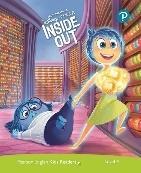
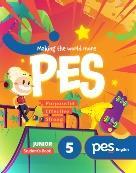
Special things: blanket, bracelet, coin, drum, earrings, necklace
We like / don’t like (sciencebooks). Do you like (football)? Yes, I do. / No, I don’t.
What has he got? He’s got (a drum). Has he got (a drum)? Yes, he has. / No, he hasn’t.
I like / don’t like this / that (bowl). I like / don’t like these / those plates.
I like / love going to the (market) because it’s (fun). I don’t like going to the (theatre) because it’s (boring).
There’s some (rice) and a lot of (honey). There isn’t any (bread).
Materials: glass, metal, paper, plastic, rubber, wood
Activities: go on a ride, go shopping / to a restaurant, visit an exhibition, watch a match / a show
Containers and quantities: bag, bottle, box, cup, glass, piece
Whose are these / those? They’re mine. / yours. / his. / hers.
What do you like doing? Do you like (watching a show)? Yes, I do. / No, I don’t.
Are there any (apples)? Is there any (rice)? Yes, there is. / are. No, there isn’t. / aren’t.
The sharks are (swimming). They aren’t (jumping).
I’m going to (play table tennis). I’m not going to (do gymnastics).
Care for the ocean: clean the oceans, have a beach clean up, make a film, pick up rubbish, tell people
Sporting activities: bounce / hit / throw a ball, jump hurdles, run / win a race
What are they doing? They’re (making a fi lm). Are they (picking up rubbish)? Yes, they are. / No, they aren’t.
What are you going to do? Are you going to (do gymnastics)? Yes, I am. / No, I’m not.
Museum Takeover Day: clean, cook in the café, help in the shop, plan an exhibition, Welcome Unit visitors, work as a tour guide
World Food Day: eat a healthy diet / a lot of fruit and vegetables, choose brown food, drink water, don’t eat a lot of sugar / junk food
International Day of Forests: close gates, don’t drop rubbish, don’t pick flowers, don’t touch animals, stay on the paths, plant trees
Museum Open Day: do a tour, draw a picture, listen to a story, look at the objects, make a model, play a game
14
Junior 5 – 5º ano | Ensino Fundamental Reader: Inside Out, by Nicola Schofield
Vocabulary 1 Grammar 1 Vocabulary 2 Grammar 2
1. Who are we?
2. Let’s use it again! Review 1 All about us (Units 1 and 2)
3. City
future
of the
4. Food for everyone! Review 2 Our community (Units 3 and 4)
5. Help our oceans!
6. Let’s play together! Review 3 Our world (Units 5 and 6)
Goodbye Goodbye from The Rise and Shine Museum Celebrations
Global citizenship
Real-world writing Project
Likes and dislikes
Do you like (football)? Yes, I do. / No, I don’t.
Asking for repetition
Sorry, I don’t understand. Can you say that again, please? Yes, of course.
Inviting, accepting / refusing
Would you like to come to (my upcycling party)? Yes, please. I’d love to. / No, thanks. Sorry, I can’t.
• I appreciate diversity.
• I appreciate special things. always, never, often, sometimes
Objects in a time capsule A Museum Trail Card /k/ can, /g/ grey
• Understand that everyone has things that are important to them.
• I learn how to upcycle. huge, little, pretty, ugly
Describe your special thing A poster about a friend
Asking for / giving directions
Excuse me. Where’s the (art gallery)? Turn right (at the restaurant). Go straight on. Turn left at (the hotel).
• Appreciate reusing old things to make new, useful objects.
• I appreciate my city. boring, clean, dirty, lovely
An invitation to a party
An exhibition of upcycled things /juː/ excuse, /ɜːr/ t
• Participate in city life and how our cities could be greener in future.
Asking / giving prices
A message about a city visit A new city /aʊ/ how, /ɪ/ is
• I learn not to waste food. cake, chips, lemonade, smoothie Understand the importance of only buying the food we need.
How much is a bottle of juice? It’s (£2.50). How much are (those apples)? They’re (£4).
Asking about an event
When is (the beach clean up)? It’s on (Sunday). What time does it start? It starts at (ten o’clock.) Where is it? It’s (on Sunny Beach).
• I appreciate our oceans. brilliant, dangerous, terrible, safe
A no-waste shopping list A no-waste menu /wəz/ was (weak form), /wɒz/ was (strong form)
• Appreciate the diversity of sea animals and our responsibility to keep the oceans clean.
A poster about a beach clean up
Inviting others
Are you free on (Thursday afternoon)? No, I’m not, sorry. / Yes, I am. Do you want to (do athletics with me)? Yes, please. See you then.
• I learn about unusual sports. badly, quickly, slowly, well
A play about helping the oceans /θ/ think, /ð/ their
• Understand the importance of being part of a team and trying out new things.
Future skills 1: Work with others
A note about an unusual sport A sports weekend Future skills
Future skills 2: Respect others Future skills 3: Oral communication
Future skills 4: Responsibility Future skills 5: Empathy Future skills 6: Being open-minded
15
Pronunciation
Functional language
/ʌ/ fun, /ɑːr/ party
urn
Conteúdos Programáticos
Mission: English 1 – a partir do 6º ano | Ensino Fundamental
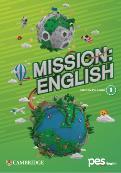
Reader: So Cute!, by Kenna Bourke

Welcome Unit Unit p. 4
Vocabulary: Personal information, Names and addresses; Countries and nationalities; Numbers 1–100; Days, dates, and times; Colors; Classroom language; Classroom objects
Vocabulary Skills Language toolkit
CEFR15: A1 (Usuário Básico)
Unit 1 We are family p. 12 Family members Daily activities
Unit 2 Have fun! p. 22
• Leisure activities
• Active hobbies Adjectives of opinion
• Reading Blog: My awesome family
• Listening Interview: Emma’s daily life on a farm
• Speaking Meeting and introducing new people
• Writing An informal email to a pen pal
• Reading Quiz: How much fun do you have?
• Listening Conversation: Choosing leisure activities
• Speaking Making and responding to suggestions
• Writing An online profile: About me
Communication Including others in a conversation (p. 32) Self-assessment Units 1–2 (p. 33)
• Reading Online posts: Clothes and activities
Simple present (affirmative, negative, questions) Adverbs of frequency
• (don’t) like / love / hate / don’t mind + -ing can / can’t for ability
Unit 3 My style p. 34 Clothes Accessories
Unit 4
Time for school p. 44
• School subjects
• School places
• Listening Interviews: What things do people carry/wear?
• Speaking: Shopping for clothes and accessories
• Writing A message: Describing a picture
• Reading Text messages: Friends making arrangements
• Listening A school tour: School places
• Speaking Asking for and giving information
• Writing A formal email to a teacher
• Present continuous (affirmative, negative, questions)
Present continuous vs. simple present
• Prepositions of time can / can’t, must / must not, have to / don’t have to for permission and obligation
16
2º
3º
PES Teens | Mission: English 1 1º bimestre Welcome Unit, Units 1, 2 2º bimestre Units 3, 4, 5 3º bimestre Units 6, 7, 8 4º bimestre Units 9, 10 1º trimestre Welcome Unit, Units 1, 2, 3
trimestre Units 4, 5, 6, 7
trimestre Units 8, 9, 10
Pronunciation Culture CLIL Cambridge Life Competencies
How to sound interested
can vs. can’t
Sounds /зː/ vs. /ɑː/ e.g. shirt vs. large
Sounds /dʒ/ vs. /ʒ/ e.g. language vs. television
• CLIL Math A survey on daily activities
• Culture Unusual hobbies around the world
Critical Thinking - Thinking about the good and bad side of things
Learning to Learn - Using feedback to improve your work
• Communication - Inviting people to give their opinion
Learning to Learn - Making notes to plan your answer
• CLIL Environmental studies Fast fashion
• Culture Democratic schools
Sounds /ʧ / vs. /∫/ e.g. cheese vs. shirt
Words ending in consonants
Long o vs. short o e.g. go vs. on
/t/, /d/ and /ɪd/ pronunciation of -ed endings e.g. clicked, apologized, waited
• CLIL Biology Eat healthy food
• Culture
Traditional homes around the world
• CLIL IT The internet and social media
• Culture Folktales from around the world
/ð/ vs. /θ/ e.g. then vs. think
/s/ consonant clusters at the beginning of words e.g. sports
• CLIL History Famous journeys from history
• Culture Voluntourism
• Learning to Learn - Putting new words into groups
• Communication - Being polite
Learning to Learn - Looking at word parts to guess meaning Critical Thinking - Identifying facts and opinions
• Communication - Starting a conversation
• Critical Thinking Finding a solution to a problem
Communication Checking understanding Learning to Learn Finding new words in a dictionary
Critical Thinking - Finding information online Learning to Learn - Planning an essay
Communication - Using words to show you’re interested
• Critical Thinking - Learning from past experience
Learning to Learn - Using sentences to learn words
Communication - Telling a story in order
• Critical Thinking - Explaining why a solution is good
Communication - Talking about things that interest you
18
Conteúdos Programáticos
1. Having fun
2. Money and how to spend it
Talking about routines and everyday activities; expressing likes and dislikes; giving warnings and stating prohibition
Role play: Buying things in a store; talking about what people are doing at the moment
Simple present review like + -ing Adverbs of frequency
Hobbies WordWise: Collocations with have
Present continuous Verbs of perception Simple present vs. present continuous Stores Clothes
3. Food for life
Talking about food; Ordering a meal; Apologizing
4. Family ties
Talking about families; Asking for permission
5. It feels like home
Talking about events in the past; Making suggestions; role play: at a market
Count and noncount nouns a/an, some, any How much / many, a lot of / lots of too and (not) enough
Possessive adjectives and pronouns whose and possessive ’s was / were
• Simple past (regular verbs)
Modifiers: very, really, pretty Simple past negative
Food and drink Adjectives to talk about food WordWise: Expressions with have
• Reading: Quiz: Do you take good care of yourself?; Blog: What do you do in your free time?; Photostory: Olivia’s new hobby
• Writing: Writing about routines
• Reading: Soap opera: Shopping; Web chat: How not to spend money; Culture: World markets

• Writing: An informal email to say what you’re doing
• Reading: Article: Food facts or food fiction?; Blog: My brother’s cooking; Photostory: The picnic
• Writing: An email about your favorite or least favorite meal
Family members Feelings
• Parts of a house
• Furniture
• Adjectives with -ed / -ing WordWise: Phrasal verbs with look
• Reading: Article: TV families; Article: The swimming pool heroes; Culture: Around the world on Children’s Day
• Writing: An invitation
• Reading: Article: Th e LEGO house; Blog: Dad gets it right! (finally); Photostory: Hey, look at that guy!
• Writing: Summary of a text; blog post
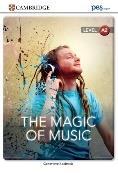
19 PES Teens | Great Time 1º bimestre Units 1, 2, 3 2º bimestre Units 4, 5, 6 3º bimestre Units 7, 8, 9 4º bimestre Units 10, 11, 12 1º trimestre Units 1, 2, 3, 4 2º trimestre Units 5, 6, 7, 8 3º trimestre Units 9, 10, 11, 12
Great Time 2 – a partir do 7º ano | Ensino Fundamental
The
Music, by Genevieve
Title Functions Grammar Vocabulary Reading
CEFR
Reader:
Magic of
Kocienda Unit
and writing
17: A2
Unit Title Functions
6. Best friends
Talking about what you like doing; talking about past events; talking about friends and friendships
7. The easy life
Giving advice; Talking about rules; asking for repetition and clarification; Role play: A phone call
8. Free time
Asking questions; talking about similarities; describing things
9. The wonders of the world
Talking about the weather; paying compliments
10. Around town
Talking about plans; inviting and making plans
Grammar Vocabulary Reading and writing
CEFR: A2
• Simple past (irregular verbs)
• Double genitive Simple past questions
have to / don’t have to should / shouldn’t; must not / don’t have to
• Past time expressions Character adjectives
Gadgets Housework
• WordWise: Expressions with like
• Reading: Article: Best friends 8,000 miles apart; Article: How we met; Culture: Friendship myths
• Writing: An apology
• Reading: Article: “… just because I didn’t want to take a bath”; Website: Product reviews; Photostory: The treasure hunt
• Writing: A paragraph about housework
• Review of question forms
• What + be + like?
Comparative adjectives
• Superlative adjectives
• can / can’t for ability
be going to for intentions
• Present continuous for plans
• Adverbs
11. Future bodies
Role play: A health problem; making predictions; sympathizing
12. Traveler’s tales
Talking about travel and transportation; talking about life experiences; Role play: Life as a bus driver/ffight attendant
will / won’t for predictions
• First conditional
• Time clauses with when
Present perfect Present perfect with ever/never
• Present perfect vs. simple past
• Collocations with time
• Descriptive adjectives
Geographical features The weather
• WordWise: Phrases with with
• Reading: Article: Mary gives everything for Teen Feed!; Text messages: At the airport; Culture: Volunteering abroad
• Writing: A blog entry about volunteering
• Reading: Article: An amazing place; Article: Could you live there?; Photostory: The competition
• Writing: An email about a place
Places in a town
• Things in town: compound nouns
• Reading: Blogs: Alice’s World; The Life of Brian; Letters to a newspaper: Our Town: What’s wrong and what can we do about it?; Culture: Ghost towns around the world
• Writing: An informal email
Parts of the body
• when and if
• WordWise: Expressions with do
• Reading: Article: Changing bodies; Web chats: Crazy things that parents say to their kids; Photostory: The phone call
• Writing: A phone message
Transportation and travel
• Travel verbs
• Reading: Blog: The nonstop traveler; Interview: The taxi driver; Culture: Hard journeys for schoolchildren
• Writing: An essay about someone you admire
20
Unit Title Functions Grammar Vocabulary Reading and writing
CEFR19: B1
1. Amazing people
Talking about things you have and haven’t done; Offering encouragement; Role play: Good causes
2. Sports moments
Talking about sports; Talking about feelings
Present perfect with just, already, and yet; Present perfect vs. simple past
• Past continuous; Past continuous vs. simple past; when and while
• Personality adjectives; Collocations; WordWise: Phrases with just
• Reading: Online survey responses: Who do you admire most?; TV show preview: The Country’s Smartest Kids; Photostory: The new café
• Writing: A short passage about someone you admire
• Sports and sports verbs; Adverbs of sequence
• Reading: Article: If you don’t give up, you can’t fail; Web forum: Your favorite sports fails!; Culture: The Olympic Games –the good and the not-so-good
• Writing: An article about an event
3. That’s entertainment
Comparing things and actions; Asking for and offering help
• Comparative and superlative adjectives (review); (not) as as comparatives; Making a comparison stronger or weaker;
• Adverbs and comparative adverbs
• Types of movies; Types of TV shows; WordWise: Expressions with get
• Reading: Article: Big movies on a small budget; TV listings: Different types of programs; Photostory: Extras
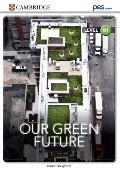
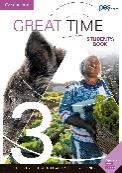
• Writing: A paragraph about your TV habits
4. The ways we learn
Asking and giving / refusing permission; Role play: Asking permission
5. My life in music
Asking about feelings; Role play: Helpful suggestions
Present perfect with for and since; a, an, the, or no article
Present perfect continuous; Present perfect vs. present perfect continuous
School subjects; Verbs about thinking
Making music; Musical instruments; WordWise: Phrasal verbs with out
• Reading: Article: An education like no other; Article: Learning is brain change; Culture: A day in the life of
• Writing: An email describing your school routine
• Reading: Online forum: Singer songwriter: Any advice?; Article: John Otway – Rock’s greatest failure; Photostory: Pop in the park
• Writing: The story of your favorite band
21
Great Time 3 – a partir do 8º ano | Ensino Fundamental Reader: Our Green Future, by Diane Naughton
Unit Title Functions
6. Making a difference Expressing surprise and enthusiasm
7. Future fun Checking information; Agreeing
Grammar Vocabulary Reading and writing
CEFR: B1
• will (not), may (not), might (not) for prediction; First conditional; unless in first conditional sentences
• Future forms;
• Question tags;
• Neither / So
8. Science counts
Talking about past habits; Talking about imaginary situations; Talking about scientific discoveries
9. What a job!
Accepting and refusing invitations; Role play: Inviting friends to join you
10. Keep healthy Talking about your health
11. Making the news
Reporting what someone has said; Expressing feelings: anger
12. Social networking Making generalizations; Giving advice
Simple past vs. past continuous (review);
• used to;
• Second conditional;
• I wish
The passive (simple present, simple past, present continuous, present perfect)
• The environment; Verbs to talk about energy
• Reading: Article: Hot topic: The environment; Leaffet: Small changes, BIG consequences; Culture: Stop! Before it’s too late
• Writing: An article for the school magazine
Future time expressions;
• Planning a party;
• WordWise: Phrases with about
• Direction and movement;
• Science
Jobs; work as / in / for; work vs. Job;
• WordWise: Time expressions with in
Past perfect; Linking expressions Time linkers; Illness: collocations
• Reading: Newspaper articles: The world today; Web chat: Planning a party; Photostory: Weekend plans
• Writing: An invitation
• Reading: Blog article: Why aren’t people more interested in science?; Web forum: What should science do next?; Culture: Great scientists
• Writing: A blog entry
• Reading: Article: Dream jobs; Article: Obsolete jobs; Photostory: For a good cause
• Writing: A short essay about jobs that will soon be obsolete
• Reading: Article: 8,000 birds to see before you die; Article: Miracle operations; Culture: Keeping healthy – stories from around the world
• Writing: A story about a sports event
Reported statements; Verb patterns: object + infinitive
Indefinite pronouns (everyone, no one, someone, etc.) all / some / none / any of them
• should(n’t), ought to
Fun; More verbs with object + infinitive; WordWise: Expressions with make
• Reading: Article: April Fool’s Day; Article: A tale of two Guys; Photostory: Th e journalist
• Writing: A news report
IT terms; Language for giving advice
• Reading: Article: Think before you act online; Short texts: Different types of messages; Culture: Communication through history
• Writing: A web page giving advice
22
Unit Title Functions Grammar Vocabulary Reading and writing
CEFR21: B1+ | A2 Key or B1 Preliminary
1. Life plans
Complaining; Talking about the future
Present tenses (review); Future tenses (review)
Making changes; Life plans WordWise: Phrases with up
2. Hard times Talking about the past; Narrative tenses (review); used to Descriptive verbs; Time periods
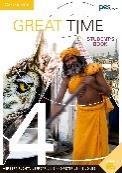
• Reading: Article: I miss my bad habits; Article: For a better life …; Photostory: What’s up with Mia?
• Writing: An email about resolutions
• Reading: Article: The Great Fire of London; Article: Family life in 17th-century Britain; Culture: Where life is really hard
• Writing: A magazine article about a historical event
3. What’s in a name?
Giving advice; Expressing obligation; Giving recommendations, warnings, and prohibitions
4. Dilemmas
Talking about hypothetical situations; Expressing wishes; Apologizing and accepting apologies
5. What a story! Telling a story
• (don’t) have to / ought to / should(n’t) / must not, had better (not); can(’t) / must(n’t)
• First and second conditional (review); Time conjunctions; wish and if only; Third conditional
• Relative pronouns;
• Defining and nondefining relative clauses; Relative clauses with which
• Making and selling; Expressions with name
Being honest; Making a decision; WordWise: now
• Reading: Article: Brand names; Article: Crazy names; Fiction: Wild Country by Margaret Johnson

• Writing: A reply to a letter asking for advice
• Reading: Quiz: What would you do?; Article: The day Billy Ray’s life changed forever; Photostory: And the hole gets deeper!
• Writing: A diary entry about a dilemma
• Types of story; Elements of a story
• Reading: Article: Everybody loves stories – but why?; Article: Hollywood fairy tales; Culture: Ireland – a nation of storytellers
• Writing: A fairy tale
23
Great Time 4 – a partir do 9º ano | Ensino Fundamental Reader: True Colors, by Diane Naughton
Unit Title Functions
6. How do they do it?
7. All the same?
8. It’s a crime
Grammar Vocabulary Reading and writing
CEFR: B1+ | A2 Key or B1 Preliminary
Talking about sequence; Explaining how things are done
Talking about permission; Talking about habits; Invitations
Present and past passive (review); have something done;
• Future and present perfect passive
make / let and be allowed to;
• be / get used to
Reporting what someone said, asked, or requested; Giving and reacting to news
9. What happened? Making deductions
10. Money
Talking about future events; Sympathizing
Reported speech (review);
• Reported questions, requests, and imperatives
Modals of deduction (present); should(n’t) have;
• Modals of deduction (past)
• Past perfect continuous; Past perfect continuous vs. past perfect
Extreme adjectives and modifiers;
• make and do
Phrasal verbs (1); Personality;
• WordWise: Phrases with all
• Reading: Article: The man who walks on air; Blog: How Do They Do That?; Fiction: The Mind Map by David Morrison
• Writing: Explaining how things are done
• Reading: Film synopses: Billy Elliot and Bend It Like Beckham; Article: My prisoner, my friend, my president, and my father; Photostory: The nerd
• Writing: An article about stereotypes
Crime;
• Reporting verbs
Mysteries;
• Expressions with go
• Reading: News reports: Thief feels sorry, Father angry victim of online con; Article: Getting creative with crime; Culture: Famous criminals
• Writing: A report of a crime
• Reading: Article: The truth is out there; Article: Lost; Fiction: How I Met Myself by David A. Hill
• Writing: Explaining a mystery
Money and value; Jobs and work; WordWise: by
11. Help! Expressing purpose; Emphasizing
Verbs followed by gerund or infinitive; to / in order to so and such
Danger and safety; Adjectives with negative; prefixes
• Reading: Article: Bitcoins: here to stay?; Web forum: Are they worth it?; Photostory: Strapped for cash
• Writing: My life in the future
• Reading: News report: Local man’s bravery rewarded; Article: Emergency? What emergency?; Culture: The Great Escape
• Writing: A story about a rescue
12. A first time for everything
Expressing regret; Talking about fears
Phrasal verbs; I wish / If only + past perfect
Phrasal verbs (2); Nervousness and fear
• Reading: Article: The first thing you remember; Readers’ letters: My first (and last) time; Fiction: Bullring Kid and Country Cowboy by Louise Clover
• Writing: A story about a bad decision
24
PES Higher | Great Time
Great Time 5 – a partir da 1ª série | Ensino Médio

Reader: Skin, by Caroline Shackleton, Nathan Paul Turner
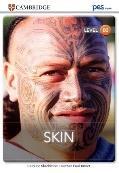
Functions & Speaking
Grammar Vocabulary
Unit 1 Survival p 12
• Making and accepting a challenge
Discussing situations and your emotional reactions to them
Unit 2 Going places p 20 Expressing surprise
• Discussing nomadic peoples
Review Units 1 & 2 - pages 28–29
Unit 3 The next generation p 30
Unit 4 Thinking outside the box p 38
Emphasizing Discussing the tiger mom style of parenting
Expressing frustration Guessing game to practice personality adjectives
Review Units 3 & 4 - pages 46–47
Unit 5 Screen time p 48
Unit 6 Bringing people together p 56
• Advice and obligation
• Talking about technology
• Using intensifying comparatives
• Discussing the use of the Internet for doing good
• Role play: Stuck in an elevator
Review Units 5 & 6 - pages 64–65
Unit 7 Always look on the bright side p 66
Unit 8 Making lists p 74
• Verbs followed by infinitive or gerund
Different meanings of verb + infinitive and verb + gerund
• Relative clauses (review) which to refer to a whole clause
• Omitting relative pronouns
• Reduced relative clauses
• Quantifiers
• so and such (review)
• do and did for emphasis
• used to vs. would
• Adverbs and adverbial phrases
• Verbs of movement
• Adjectives to describe uncomfortable feelings
• Wordwise: right
Groups of people
• Phrasal verbs (1)
Costumes and uniforms Bringing up children
Personality adjectives
Common adverbial phrases Wordwise: good
• Obligation, permission, and prohibition (review) Necessity: didn’t have to / didn’t need to / needn’t have Ability in the past: (could, was/were able to, managed to, succeeded in)
• Comparatives
• Linkers of contrast
Technology (nouns) Technology (verbs)
• Ways of speaking
• Love and relationships
Functions & Speaking Grammar Vocabulary
• Cheering someone up
• Silver linings game: thinking of optimistic solutions
Qualifying a response
• Discussing wonders of the world
Review Units 7 & 8 - pages 82–83
Unit 9 Be your own life coach p 84
Asking someone politely to change their behavior Discussing further education and work experience
• Ways of referring to the future (review) Future continuous Future perfect
• Conditionals (review)
• Mixed conditionals
• I wish and If only
• I would prefer to, I would prefer it if / It’s (about)
• time, I’d rather
• Phrases to talk about the future: about to, off to, (period of time) away from
• Feelings about future events Wordwise: so
Phrasal verbs (2)
• Alternatives to if: suppose, provided, as long as, otherwise, unless
Life’s ups and downs Work and education
25
Unit 10
Spreading the news p 92
Making a point Introducing news
• Discussing the ethics of journalism
• Interviewing a well-known person
Review Units 9 & 10 - pages 100–101
Unit 11 Space and beyond p 102
Unit 12 More to explore p 110
• Sympathizing about past situations
• Discussing life in space
• Discussing the greatest movies about space
• Speaking persuasively
• Giving a presentation about human activity and the natural world
Review Units 11 & 12 - pages 118–119
• Reported speech (review)
• Reported questions and requests
Speculating (past, present, and future)
• Cause and effect linkers
Passive report structures The passive: verbs with two objects
Pronunciation - pages 120–121 Get it right! - pages 122–126
Pronunciation
Diphthongs: alternative spellings
Phrasal verb stress
Adding emphasis with so, such, do, or did
Pronouncing words with gh
Pronunciation
The
Sharing news Reporting verbs
• Wordwise: Expressions with way
Space idioms
• Adjectives commonly used to describe movies
Geographical features Verb + noun collocations
Speaking activities - pages 127–128
Think Skills
Train to Think: Thinking rationally
• Self-esteem: How adventurous are you?
• Train to Think: Distinguishing fact from opinion
• Values: Learning from other cultures
Train to Think: Changing your opinions Self-esteem: Developing independence
Train to Think: Lateral thinking Values: Appreciating creative solutions
Reading: Article: Sacrifice for survival?; Article: The ultimate survivor; Photostory: The challenge
• Writing: An email about an experience
• Listening: Radio show: Desperate Measures
Reading: Article: Refugees bring new life to a village; Blog: From Miami to Mexico City; Culture: Nomadic People
• Writing: An informal email
• Listening: Radio interview about migration in nature
• Reading: Blog: An embarrassing dad; Book blurb and reviews: For and Against –Tiger Moms Literature: About a Boy by Nick Hornby
• Writing: An essay about bringing up children
• Listening: Radio show about bringing up children in different cultures
• Reading: Article: Lion lights; Web post: A problem on Answers4U; Photostory: Writer’s block Writing: A story ending: “Thanks, you saved my life!” Listening: Talking heads – being imaginative
Think Skills
Train to Think: The PMI strategy Self-esteem: Learning from elderly people
Reading: Texts: Smart screens?; Article: Great success for teenage teachers: When silver surfers get connected; Culture: When pictures learned to walk and talk: The history of film Writing: Instructions Listening: A conversation about watching too much TV
sound: negative auxilliaries + you
The
• Train to Think: Exaggeration
• Values: Doing good
Intonation: encouraging someone
Train to Think: Learning to see things from a different perspective
• Self-esteem: What cheers me up
Reading: Blog: The day people started talking; Article: An Ice Cold Summer; Literature: A kind of loving by Stan Barstow
• Writing: An essay about social media
• Listening: Radio show: Radio romances
• Reading: Blog: Me, Myself & My Take on the World; Web page: QUOTATIONSforWORRIERS; Photostory: The contest
• Writing: A short story
• Listening: Radio show: Silver Linings
26
/ə/
sound
/tʃ/
Weak forms with past modals
The /tən/ word ending
Train to Think: The “goal-setting” checklist
• Values: Lists
• Train to Think: Avoiding generalizations
• Self-esteem: Being diplomatic
Linking: omission of the /h/ sound
Train to Think: Identifying the source of a piece of news
• Values: News or not?
Reading: Book review: The Checklist Manifesto by Atul Gawande; Blog: Andrew’s list blog; Culture: The New Seven Wonders of the World
• Writing: An essay: A Modern Wonder of the World
• Listening: An interview about why we make lists
Reading: Presentation: Life and how to live it; Quiz: Are you in control?; Literature: The Remains of the Day by Kazuo Ishiguro
Writing: An article for the school magazine Listening: A radio show about life choices
• Reading: Magazine article: Everybody’s Tweeting; Article: Bad news Photostory: The news clip
• Writing: A magazine article about an interview with a well-known person
• Listening: An interview with a foreign correspondent
Sentence stress: modals for speculation
Flapping t and d
Train to Think: Spotting ffawed arguments
• Self-esteem: Who we are
• Train to Think: Exploring hidden messages
• Values: Human activity and the natural world
Reading: Article: They might not come in peace …; Blog: My all-time favorite movies about space; Culture: Real Humans
• Writing: A report about a problem on a school trip
• Listening: A talk about the Voyager mission
• Reading: Article: Our undiscovered world; Article: Discoverers; Literature: The Lost World by Arthur Conan Doyle
• Writing: A short biography
• Listening: A talk about discovering new species
27
Great Time 6 – a partir da 2ª série | Ensino Médio
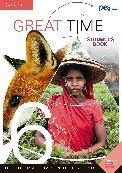
Reader: Robots: The Next Generation, by Caroline Shackleton, Nathan Paul Turner
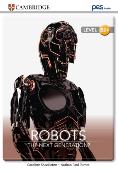
Functions & Speaking Grammar Vocabulary
Unit 1
Brothers and sisters p 12
Unit 2 Sleep on it p 20
• Using emotive language
• Discussing problems with siblings Talking about personal conffict
Giving advice Talking about dreams Discussing sleeping habits in your country
Review Units 1 & 2 - pages 28–29
Unit 3 Lucky breaks p 30
Unit 4
Laughter is the best medicine p 38
Giving encouragement to someone who’s feeling nervous Talking about luck
Responding to jokes
• Talking about famous comedians
Review Units 3 & 4 - pages 46–47
Unit 5 Thrill seekers p 48
Giving and reacting to an opinion
• Discussion about thrill seeking
Unit 6 Followers p 56 Complaining Discussing sports teams
Review Units 5 & 6 - pages 64–65
Unit 7
Beauty is in the eye of the beholder p 66
Unit 8 It’s all Greek to me! p 74
• Language of persuasion
• Discussing reactions to the blog
• Talking about habits
• Adverbs to express attitude
Past tense with hypothetical meaning Adverbs for modifying comparatives
Mixed conditionals (review) Alternatives to if
• Emphatic structures
• Boosting
• Personality (1)
• Personal conffict
• Sleep
• Idioms with sleep and dream
• Phrasal verbs
• Expressions with luck Wordwise: Expressions with over
Laughter
• Idioms with laugh and joke
• Participle clauses
• Verbs of perception with infinitive or gerund
• Modals 1: may, might, can, could, will, won’t
• Modals 2: should, shouldn’t, must, mustn’t, can’t
• Substitution Ellipsis
• Thrill seeking
• Idioms related to noise
Admiration Fame WordWise: Expressions with take
• Fads
• Emotional responses
• Saying that you don’t understand or didn’t fully hear
• Talking about language
Review Units 7 & 8 - pages 82–83
• Relative clauses with determiners and prepositions however, wherever, whatever, etc.
• Language and communication Personality (2)
28
Unit 9 Is it fair? p 84
Unit 10 You live and learn p 92
Functions & Speaking Grammar
Talking imprecisely about numbers Discussing money
Reacting to news Talking about higher education and you
Review Units 9 & 10 - pages 100–101
Unit 11 21st century living p 102
Unit 12 Unsung heroes p 110
Telling someone to keep calm Talking about 21st century problems
Expressing anticipation
• Planning a class award
• Talking about things you’d intended to do but didn’t
Review Units 11 & 12 - pages 118–119
Negative inversion Spoken discourse markers
• Reported verb patterns (review)
• Passive report structures
• More on the passive
• Causative have (review)
• Modal passives (review)
• Future perfect; future continuous (review)
• Future in the past
Pronunciation - pages 120–121 Get it right! - pages 122–126
Vocabulary
• Court cases
• Fairness and honesty
Wordwise: Expressions with on
Higher education Life after school
(not) Getting angry Verbs with prefixes up and down
• Awards
• Success and failure
• WordWise: Expressions with in
Speaking activities - pages 127–128
C. Cheering someone up and sympathising about past situations; Life’s up and downs; A helping hand; Adjectives to describe uncomfortable feelings; Talking about past ability
D. Introducing news; Ways of speaking; News mad?; Verb + noun collocations with make, take, play, do, give; Cause and effect linkers; Sharing news
Pronunciation
Intonation: showing emotions
Different ways of pronouncing c and g
Unstressed words in connected speech
Telling jokes: pacing, pausing and punchlines
Think Skills
• Train to Think: Questioning widely accepted theories
• Values: Relationships
Train to Think: The rule of threes Self-esteem: Getting enough rest
Train to Think: Behaviour based on myths rather than facts
• Values: How do we feel about luck?
Reading: Article: The pecking order; Web page: People power to help you with your problems; Literature: Pride and Prejudice by Jane Austen Writing: An email Listening: A scene from a soap opera – The Street
• Reading: Magazine article: The great teen sleeping crisis?; Article: Ten facts about dreams; Culture: Sleep in different cultures
• Writing: A proposal
• Listening: Interview with a sleep expert
Reading: Magazine article: My lucky break; Blog: Serendipity; Photo story: The talisman
• Writing: A story
• Listening: Conversation about lucky objects and routines
• Train to Think: Divergent thinking
• Self-esteem: Laughter
Reading: Article: The science of laughter; Article: The world of comedy: Shappi Khorsandi; Literature: Three Men in a Boat by Jerome K. Jerome
• Writing: A review
• Listening: Jokes
29


























